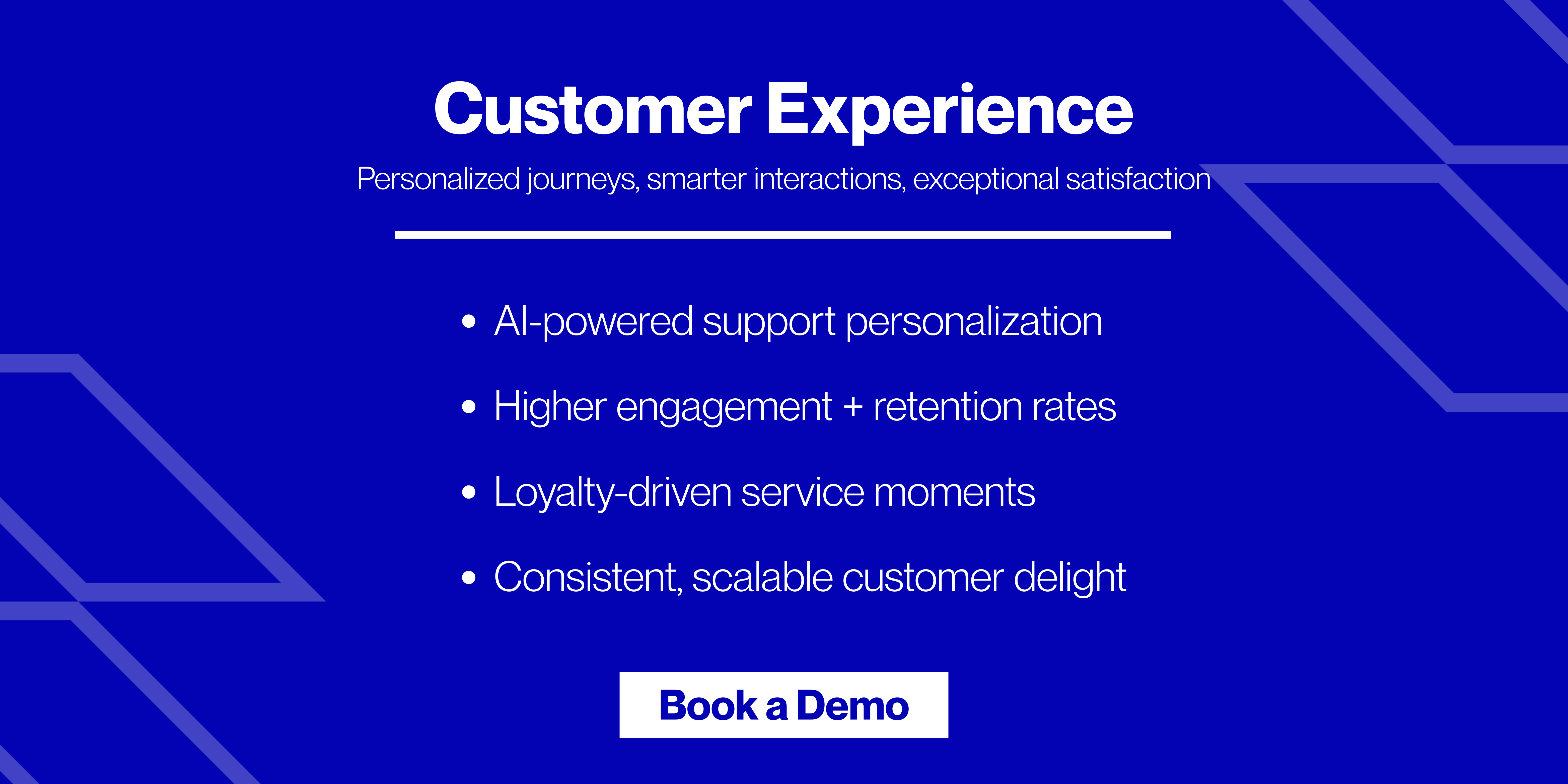Key Takeaways
- Excellent customer service directly impacts customer satisfaction, loyalty, and lifetime value.
- Modern service goes beyond speed—empathy, personalization, and proactive support matter more than ever.
- Customer service has evolved into a growth engine, with multichannel, data-driven strategies at the core.
- Companies that prioritize service are not just solving problems, they’re building unforgettable experiences.
Why Customer Service and Customer Satisfaction Go Hand in Hand
There’s no shortage of good products available today. In fact, most consumer brands and D2C companies face dozens of competitors with similar offerings. But you know what’s way harder to find? A genuinely great customer experience specialist.
We’re talking about the kind of customer experience where you feel like someone actually gets you. Where support isn’t a headache, and you don’t have to jump through hoops just to get a refund, ask a question, or fix a problem.
For CX leaders in the US, UK & Australia, this is a strategy. Customer service is often the first—and sometimes only—real interaction your customer has with your team. That moment sets the tone. It shapes how they feel about your brand. And yes, it can be the make-or-break factor between a loyal customer and a lost one.
So, do customer service and customer experience go hand in hand? Absolutely. In fact, service defines experience. Because at the end of the day, people remember how you made them feel. Ready to dive into the “how” and “why”? Let’s break it down!
The Impact of Customer Service On Customer Satisfaction
You could have the best product in the world, but if a customer feels ignored, dismissed, or frustrated when something goes wrong? Game over. Satisfaction tanks, and so does your chance of winning them back. However…
Even if something does go wrong—maybe there’s a delay, a glitch, or a mix-up—if your customer service team handles it with empathy, speed, and genuine care, one issue can turn into a loyalty-building moment.
Data backs this up:
- A Salesforce study found that 92% of customers are more likely to make another purchase after a positive support experience.
- 95% of customers will tell others about a bad experience that they’ve had with a brand.
- Businesses that excel at customer experience solutions grow revenues at 4–8% above market average (Bain & Company).
- Customers who are classified as “promoters” in the “Net Promoter Score” metric have 6–14x higher lifetime value than “detractors.”
So yes, customer service isn’t just a “nice-to-have.” It’s a profit booster.
The Real Impact of Customer Service on Brand Loyalty
Customer satisfaction isn’t just about solving a problem. It’s about the how. How do you make someone feel when they’re stuck, annoyed, or just trying to get help? That’s what separates forgettable brands from unforgettable ones.
Because here’s the truth: people don’t stay loyal to companies, they stay loyal to how companies treat them.
Here’s the impact customer service when done right has on businesses:
- Increases lifetime value: You want customers who stick around, right? The kind who come back not just once or twice, but again and again. That doesn’t happen because of flashy ads. It happens because your support team made them feel appreciated when it mattered most.
- Reduces churn—even when things go wrong: Mistakes happen. Shipping gets delayed. Features break. But here’s the good news: people are surprisingly forgiving if they feel taken care of. 80% of customers studied by Qualtrics said that they would forgive a bad customer experience if they rated a business as having great customer service. A sincere apology, fast action, and a little human empathy? That can turn a frustrated customer into a lifelong fan.
- Drives referrals: When someone has a really good customer service experience, they don’t just keep it to themselves—they tell their friends, post on LinkedIn, or leave a glowing review. 70% of loyal customers are likely to refer your brand to their friends and family. That’s marketing money can’t buy. Happy customers are your best brand advocates.
- Sets you apart in a crowded market: Most products and services have competitors that look, feel, and function pretty similarly. Customer service is the one advantage competitors can’t easily copy. When your service is consistently warm, fast, and helpful, you instantly become the brand that people trust and return to.
Great customer service isn’t just about resolving issues—it’s about building loyalty. And loyalty is what keeps your business growing without having to constantly chase new leads.
How Has the Role of Customer Service Evolved?
There was a time—Not long ago, service meant toll-free numbers, endless phone calls, and crossing your fingers someone would eventually pick up. Fast forward to now? That old-school support model wouldn’t cut it for a minute.
Customer service has gone from reactive and frustrating… to proactive, personalized and delightful growth engine. Here’s how:
- Multichannel everything: Today’s customers don’t want to call you—they want to message, tweet, email, live chat outsourcing, or even solve the problem themselves with a good help center article. They expect support on their terms, wherever they are. If your team’s only available by phone from 9–5? You’re probably already losing people.
- Smarter automation, not just robots: Automation used to feel cold and robotic (press 1, press 2, press 3…). Now? AI-powered tools actually help. Chatbots can answer FAQs in seconds, route tickets to the right person, and keep customers updated without them having to ask. And when something’s too complex? They hand it off smoothly to a human.
- Personalization is everything: 71% of customers expect brands to deliver personalized interactions, according to a study by McKinsey. They expect you to know them—what they bought, what issue they had last month, what their preferences are. With CRM tools and support integrations, you can meet them with context, not scripted replies.
- Insights that drive real improvement: Modern customer service teams aren’t just putting out fires—they’re looking at the big picture. They analyze trends, spot recurring issues, and feed insights back into product, marketing, and operations.
So what does all this mean?
The best companies no longer see service as a cost because they treat it as a competitive advantage. Customer service is no longer just about answering questions. It’s about:
- Creating loyalty
- Preventing churn
- Increasing lifetime value
- Gathering product feedback
- And yes, making your company feel human
Customer service has leveled up. If you want to stay competitive, it’s time to stop thinking of it as a “back office” function—and start seeing it as your frontline.
5 Ways to Create an Excellent Customer Service Experience
Want your customer service to make customers go “wow, that was amazing”? Here are five simple but powerful ways to deliver an excellent customer service experience that keeps people coming back:
- Train for empathy and not just efficiency: Teach your team to truly listen, mirror tone, and respond like they’re talking to a real person. Use real support examples during training, not just hypotheticals. Show what empathy sounds like in action.
- Speed matters, but clarity wins: People want fast responses. But what they really want is helpful, clear, no-fluff answers. Customers who get their issue resolved quickly are the ones who are happiest.
- Close the loop: Even if the issue seems resolved, always follow up. Just send out a simple email checking in to make sure everything’s working smoothly. It shows you care after the transaction, and that’s what builds trust.
- Empower your team to make it right: Give your agents permission to make decisions, solve problems, and create little moments of delight—without waiting for a manager’s blessing.
- Gather and use feedback: Track CSAT, NPS, post-chat ratings—then actually dig into the responses. Understand what customers keep mentioning, what’s frustrating them and what you’re doing really well that you should do more of. Then share those insights across teams and incorporate the feedback in your product or service. Finally, circle back with customers and let them know that you’ve actually taken their feedback on board.
The ROI of Exceptional Service
Here’s the truth most brands eventually learn the hard way: Customer service isn’t just a “support function”, it’s a revenue driver. Because let’s be honest—most companies offer good-enough products. What really sets you apart? How you make people feel. And that’s where exceptional service becomes your secret weapon. Great service isn’t just about solving tickets, it’s about:
- Building relationships
- Strengthening loyalty
- Creating those “wow” moments that customers love talking about.
Get this right, and you will have a base of loyal customers who:
- Purchase more often
- Spend more on each purchase
- Rave about you to their friends and family
For D2C companies generating $5M+ annually, this isn’t optional, it’s the path to sustainable growth.
If you’re ready to raise your service game, that’s where we come in. At Atidiv, we help businesses like yours turn service into strategy. We blend expert-trained agents with cutting-edge tools to create support systems that are scalable, flexible, and always on-brand. Whether you want to build omnichannel customer experience solutions or just need help scaling up support for the holidays, we’ve got you covered. Partner with Atidiv to scale smarter!
FAQs on Customer Service and Customer Satisfaction
1. How does customer service affect customer satisfaction?
Great customer service makes people feel heard and valued, which boosts satisfaction, trust, and loyalty. A bad experience, on the other hand, can quickly turn a happy customer into an ex-customer.
2. What’s the difference between customer service and customer experience?
Customer service is one piece of the puzzle—it’s the direct help you offer. Customer experience is the big picture, and service plays a huge role in how customers feel about your brand overall.
3. How has the role of customer service evolved in recent years?
It’s shifted from being reactive and phone-based to proactive, digital, and multichannel. Today, service is a key part of brand strategy, not just a support function.
4. What makes an excellent customer service experience?
Empathy, fast and helpful responses, personalized support, and follow-through. Bonus points for anticipating needs before the customer has to ask.
5. How can I improve my company’s customer service right now?
Start by training your team in emotional intelligence, speeding up response times, using customer feedback, and investing in tools that help you serve faster and smarter.

